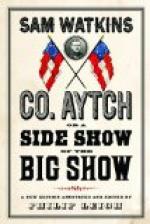“Is she?”
Her pale blue eyes seemed to open a little wider, and she looked at him searchingly. He could not keep back the words that rose to his tongue.
“You mean that your dead life now lives in Elizabeth.”
“Yes, I suppose that that is it.”
They asked each other whether any part of one’s nature is ever really dead.
A few moments after the pilgrims were heard singing, and Evelyn would have to go on the stage. She pressed her hands against her forehead, ridding herself by an effort of will of her present individuality. The strenuous chant of the pilgrims grew louder, the procession approached, and as it passed across the stage Elizabeth sought for Tannhaeuser, but he was not among them. So her last earthly hope has perished, and she throws herself on her knees at the foot of the wayside cross. And it was the anguish of her soul that called forth that high note, a G repeated three times; and it seemed to Ulick that she seemed to throw herself upon that note, that reiterated note, as if she would reach God’s ears with it and force him to listen to her. In the religious, almost Gregorian, strain her voice was pure as a little child, but when she spoke of her renunciation and the music grew more chromatic, her voice filled with colour—her sex appeared in it; and when the music returned to the peace of the religious strain, her voice grew blanched and faded like a nun’s voice. Henceforth her life will be lived beyond this world, and as she walked up the stage, the flutes and clarionets seemed to lead her straight to God; they seemed to depict a narrow, shining path, shining and ascending till it disappeared amid the light of the stars.
“Well,” she said, “did I sing it to your satisfaction?”
“You’re an astonishing artiste.”
“No, that’s just what I am not. I go on the stage and act; I couldn’t tell you how I do it; I am conscious of no rule.”
“And the music?”
“The music the same. I have often been told that I might act Shakespeare, but without music I could not express myself. Words without music would seem barren; I never try to sing, I try to express myself. But you’ll see, my father won’t think much of my singing. He’ll compare me to mother, and always to my disadvantage. I cannot phrase like her.”
“But you can; your phrasing is perfection. It is the very emotion—”
“Father won’t think so; if he only thought well of my singing he would forgive me.”
“How unaffected you are; in hearing you speak one hears your very soul.”
“Do you? But tell me, is he very incensed? Shall I meet a face of stone?”
“He is incensed, no doubt, but he must forgive you. But every day’s delay will make it more difficult.”
“I know, I know.”
“You cannot go to-morrow?”
“Why not?”
“To-morrow you sing this opera. Go on Saturday; you’ll be sure to find him on Saturday afternoon. He has a rehearsal in the morning and will be at home about four in the afternoon.”




